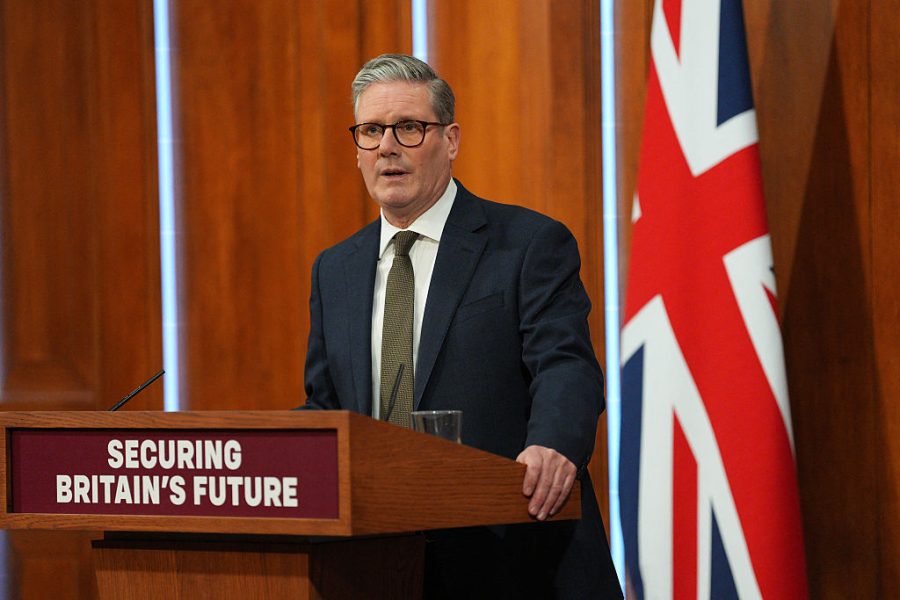You’re being ridiculous, they kept saying. Why do you keep talking about fish? The Brussels lobby could scarcely conceal its disdain when rumours emerged that the price of Britain concluding a defence agreement with the EU at next month’s London summit might be concessions on fishing rights.
Defence secretary John Healey chided Labour’s critics for their ‘Brexit rhetoric’. Daniel Zeichner, the food security minister, could hardly have been clearer when he appeared in front of the House of Commons Environment, Food and Rural Affairs Committee at the beginning of April. He dismissed the idea of defence being negotiated as part of a wider conversation about the UK/EU relationship, including access to fisheries: ‘No decisions have been taken and there is no linkage’.
Brussels was never going to treat us indulgently – why on earth would it?
Yesterday the Times reported that decisions had, in fact, been taken and there was, in fact, a ‘linkage’. This new defence agreement will allow UK manufacturers access to the EU’s new €150 billion (£129 billion) Security Action for Europe loan scheme. In return, the government will reportedly sign a multi-year deal with Brussels which will freeze the quotas that EU fishermen can catch in UK waters at the current 75 per cent of pre-Brexit levels. Any notion of reducing the quota further will therefore be off the table for the time being.
None of this should surprise us. I sketched out much the same course of action last month, and our European neighbours were certainly unsubtle about agreeing to a defence pact tied to concessions on fishing. It was never plausible that the EU would meekly consent to restrict negotiations to those areas we deemed acceptable; the slightly sanctimonious high moral tone emerging from the UK’s defence industry did not help.
‘The longer this process takes, the less likely we are to be able to respond to emerging security threats – despite having the capability, the political will and the moral duty to do so,’ said Kevin Craven, chief executive of ADS, the trade association for Britain’s aerospace, defence, security and space companies.
For some in the EU, though, it was impossible to lose out, regardless of what form the deal took. If Britain did not finalise a defence agreement, whatever the cost to other sectors, then BAE Systems, Rolls-Royce, GKN and Eurofighter would all have been locked out of the loan system, as would US-based manufacturers. This would have cleared the way for French and German companies like Thales, Naval Group, Rheinmetall and KNDS.
Inevitably, the fishing industry is deeply unhappy with this prospect. The National Federation of Fishermen’s Organisations was scathing about what it called a ‘neocolonial relationship with the EU’. This is made worse by the fact that around half of the quota is taken by vessels with British flags but foreign ownership, in particular companies in Iceland, Spain and the Netherlands.
Pragmatists who believe a deal was a foregone conclusion point to the fact that we are not weighing sectors of equal heft. UK defence exports are worth around £14.5 billion, while fish sales are only worth £1.7 billion. In a forced choice over which to sacrifice, there is no choice at all.
There will likely be other areas in which the EU will seek new arrangements, such as an EU-wide youth mobility scheme. It is believed that the UK will also pursue so-called ‘dynamic alignment’ on sanitary and phytosanitary checks at the EU/UK border to minimise delays and bureaucracy. The summit in mid-May is an opportunity for the EU to examine all aspects of its relations with Britain as both sides prepare to review the post-Brexit Trade and Cooperation Agreement in May 2026.
For all the government’s talk of resetting its relationship with the EU, Keir Starmer still somehow seems startled, almost dismayed, when Britain is not fêted as a long-lost sibling by EU member states. It is a counter-intuitive progressive manifestation of British exceptionalism to imagine that our presence or absence always weighs heavily on the minds of the 27 EU member states of whom we took our leave at the end of January 2020.
Brussels was never going to treat us indulgently; why on earth would it? If what the Times has reported is broadly accurate, it now falls to the government and Starmer to demonstrate that they have made the least onerous and most advantageous trade-offs to win the outcomes they wanted or needed at next month’s summit. As the dolphins in The Hitchhiker’s Guide to the Galaxy put it, so long, and thanks for all the fish.








Comments